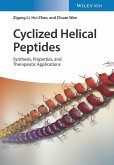Cell-Penetrating Peptides (eBook, ePUB)
Design, Development and Applications
Redaktion: Oba, Makoto; Demizu, Yosuke
142,99 €
142,99 €
inkl. MwSt.
Sofort per Download lieferbar

0 °P sammeln
142,99 €
Als Download kaufen

142,99 €
inkl. MwSt.
Sofort per Download lieferbar

0 °P sammeln
Jetzt verschenken
Alle Infos zum eBook verschenken
142,99 €
inkl. MwSt.
Sofort per Download lieferbar
Alle Infos zum eBook verschenken

0 °P sammeln
Cell-Penetrating Peptides (eBook, ePUB)
Design, Development and Applications
Redaktion: Oba, Makoto; Demizu, Yosuke
- Format: ePub
- Merkliste
- Auf die Merkliste
- Bewerten Bewerten
- Teilen
- Produkt teilen
- Produkterinnerung
- Produkterinnerung

Bitte loggen Sie sich zunächst in Ihr Kundenkonto ein oder registrieren Sie sich bei
bücher.de, um das eBook-Abo tolino select nutzen zu können.
Hier können Sie sich einloggen
Hier können Sie sich einloggen
Sie sind bereits eingeloggt. Klicken Sie auf 2. tolino select Abo, um fortzufahren.

Bitte loggen Sie sich zunächst in Ihr Kundenkonto ein oder registrieren Sie sich bei bücher.de, um das eBook-Abo tolino select nutzen zu können.
The modern reference on the rational design and development of cell-penetrating peptides (CPPs) for use in cellular delivery of drugs and various other cargoes.
- Geräte: eReader
- mit Kopierschutz
- eBook Hilfe
- Größe: 32.3MB
Andere Kunden interessierten sich auch für
![Cell-Penetrating Peptides (eBook, PDF) Cell-Penetrating Peptides (eBook, PDF)]() Cell-Penetrating Peptides (eBook, PDF)142,99 €
Cell-Penetrating Peptides (eBook, PDF)142,99 €![Chemistry and Biology of Non-canonical Nucleic Acids (eBook, ePUB) Chemistry and Biology of Non-canonical Nucleic Acids (eBook, ePUB)]() Naoki SugimotoChemistry and Biology of Non-canonical Nucleic Acids (eBook, ePUB)124,99 €
Naoki SugimotoChemistry and Biology of Non-canonical Nucleic Acids (eBook, ePUB)124,99 €![Enzyme Engineering (eBook, ePUB) Enzyme Engineering (eBook, ePUB)]() Manfred T. ReetzEnzyme Engineering (eBook, ePUB)142,99 €
Manfred T. ReetzEnzyme Engineering (eBook, ePUB)142,99 €![Functional Biomaterials (eBook, ePUB) Functional Biomaterials (eBook, ePUB)]() Functional Biomaterials (eBook, ePUB)178,99 €
Functional Biomaterials (eBook, ePUB)178,99 €![Cyclized Helical Peptides (eBook, ePUB) Cyclized Helical Peptides (eBook, ePUB)]() Zigang LiCyclized Helical Peptides (eBook, ePUB)124,99 €
Zigang LiCyclized Helical Peptides (eBook, ePUB)124,99 €![Manufacturing of Pharmaceutical Proteins (eBook, ePUB) Manufacturing of Pharmaceutical Proteins (eBook, ePUB)]() Stefan BehmeManufacturing of Pharmaceutical Proteins (eBook, ePUB)133,99 €
Stefan BehmeManufacturing of Pharmaceutical Proteins (eBook, ePUB)133,99 €![Cell-free Protein Synthesis (eBook, ePUB) Cell-free Protein Synthesis (eBook, ePUB)]() Cell-free Protein Synthesis (eBook, ePUB)120,99 €
Cell-free Protein Synthesis (eBook, ePUB)120,99 €-
-
-
The modern reference on the rational design and development of cell-penetrating peptides (CPPs) for use in cellular delivery of drugs and various other cargoes.
Dieser Download kann aus rechtlichen Gründen nur mit Rechnungsadresse in D ausgeliefert werden.
Produktdetails
- Produktdetails
- Verlag: Wiley-VCH
- Erscheinungstermin: 30. November 2022
- Englisch
- ISBN-13: 9783527836000
- Artikelnr.: 66899574
- Verlag: Wiley-VCH
- Erscheinungstermin: 30. November 2022
- Englisch
- ISBN-13: 9783527836000
- Artikelnr.: 66899574
- Herstellerkennzeichnung Die Herstellerinformationen sind derzeit nicht verfügbar.
Prof. Makoto Oba received his Ph.D. degree in pharmaceutical sciences from Kyushu University in 2004. He joined the faculty of the University of Tokyo (2004-2010) and Nagasaki University (2010-2020). He moved to Kyoto Prefectural University of Medicine on 2020 as full Professor at Graduate School of Medicine. He has authored over 100 scientific publications and has received several awards, including the Pharmaceutical Society of Japan Award for Young Scientists (2013), Nagasaki Prefectural Science and Technology Award for Young Scientists (2016), and the Incentive Award in Synthetic Organic Chemistry (2019). Dr. Yosuke Demizu received his Ph.D. in pharmaceutical sciences from Kyushu University in 2006. He joined the faculty of Tokushima Bunri University (2004-2005) and then at Nagasaki University (2006-2008). He moved to the National Institute of Health Sciences (NIHS) as a researcher, and was promoted to head the division of organic chemistry in 2017. He has authored over 150 scientific publications and has received several awards, including the Incentive Award in Synthetic Organic Chemistry, Japan (2006, 2010) and the Award for Young Investigators from the Japanese Peptide Society (2014).
Introduction
PART 1: DESGIN OF CPPS
Classification of cell-penetrating peptides
Arginine-rich cell-penetrating peptides: recent advances of design and applications for intracellular delivery
Cationic cell-penetrating peptides
Amphipathic cell-penetrating peptides
Hydrophobic cell-penetrating peptides
Foldamers
PART 2: MECHANISM OF CPPS
Peptide Structure: Electrophysiological analysis, nuclear magnetic resonance analysis, and molecular dynamics simulation of direct penetration of cell-penetrating peptides through bilayer lipid membranes
Cellular uptake mechanisms of arginine-rich cell-penetrating peptides
Endosomal escape
Pharmacokinetics of therapeutic and diagnostic agents conjugated with cell-penetrating peptides
PART 3: DELIVERY TOOLS
Drug delivery
Peptide & protein delivery
Cell-penetrating peptides for nucleic acid delivery
PPMOs: a case study for cell-penetrating peptide application
Cell penetrating peptide-conjugated polymer micelles for pDNA/siRNA delivery
Lipid-based nanoparticles using cell-penetrating peptides
PART 4: APPLICATIONS
Cell-penetrating peptides as tools to facilitate oral delivery of biopharmaceuticals
Intranasal delivery
Clinical trials
Applications in plants
PART 1: DESGIN OF CPPS
Classification of cell-penetrating peptides
Arginine-rich cell-penetrating peptides: recent advances of design and applications for intracellular delivery
Cationic cell-penetrating peptides
Amphipathic cell-penetrating peptides
Hydrophobic cell-penetrating peptides
Foldamers
PART 2: MECHANISM OF CPPS
Peptide Structure: Electrophysiological analysis, nuclear magnetic resonance analysis, and molecular dynamics simulation of direct penetration of cell-penetrating peptides through bilayer lipid membranes
Cellular uptake mechanisms of arginine-rich cell-penetrating peptides
Endosomal escape
Pharmacokinetics of therapeutic and diagnostic agents conjugated with cell-penetrating peptides
PART 3: DELIVERY TOOLS
Drug delivery
Peptide & protein delivery
Cell-penetrating peptides for nucleic acid delivery
PPMOs: a case study for cell-penetrating peptide application
Cell penetrating peptide-conjugated polymer micelles for pDNA/siRNA delivery
Lipid-based nanoparticles using cell-penetrating peptides
PART 4: APPLICATIONS
Cell-penetrating peptides as tools to facilitate oral delivery of biopharmaceuticals
Intranasal delivery
Clinical trials
Applications in plants
Introduction
PART 1: DESGIN OF CPPS
Classification of cell-penetrating peptides
Arginine-rich cell-penetrating peptides: recent advances of design and applications for intracellular delivery
Cationic cell-penetrating peptides
Amphipathic cell-penetrating peptides
Hydrophobic cell-penetrating peptides
Foldamers
PART 2: MECHANISM OF CPPS
Peptide Structure: Electrophysiological analysis, nuclear magnetic resonance analysis, and molecular dynamics simulation of direct penetration of cell-penetrating peptides through bilayer lipid membranes
Cellular uptake mechanisms of arginine-rich cell-penetrating peptides
Endosomal escape
Pharmacokinetics of therapeutic and diagnostic agents conjugated with cell-penetrating peptides
PART 3: DELIVERY TOOLS
Drug delivery
Peptide & protein delivery
Cell-penetrating peptides for nucleic acid delivery
PPMOs: a case study for cell-penetrating peptide application
Cell penetrating peptide-conjugated polymer micelles for pDNA/siRNA delivery
Lipid-based nanoparticles using cell-penetrating peptides
PART 4: APPLICATIONS
Cell-penetrating peptides as tools to facilitate oral delivery of biopharmaceuticals
Intranasal delivery
Clinical trials
Applications in plants
PART 1: DESGIN OF CPPS
Classification of cell-penetrating peptides
Arginine-rich cell-penetrating peptides: recent advances of design and applications for intracellular delivery
Cationic cell-penetrating peptides
Amphipathic cell-penetrating peptides
Hydrophobic cell-penetrating peptides
Foldamers
PART 2: MECHANISM OF CPPS
Peptide Structure: Electrophysiological analysis, nuclear magnetic resonance analysis, and molecular dynamics simulation of direct penetration of cell-penetrating peptides through bilayer lipid membranes
Cellular uptake mechanisms of arginine-rich cell-penetrating peptides
Endosomal escape
Pharmacokinetics of therapeutic and diagnostic agents conjugated with cell-penetrating peptides
PART 3: DELIVERY TOOLS
Drug delivery
Peptide & protein delivery
Cell-penetrating peptides for nucleic acid delivery
PPMOs: a case study for cell-penetrating peptide application
Cell penetrating peptide-conjugated polymer micelles for pDNA/siRNA delivery
Lipid-based nanoparticles using cell-penetrating peptides
PART 4: APPLICATIONS
Cell-penetrating peptides as tools to facilitate oral delivery of biopharmaceuticals
Intranasal delivery
Clinical trials
Applications in plants







